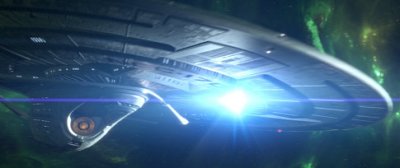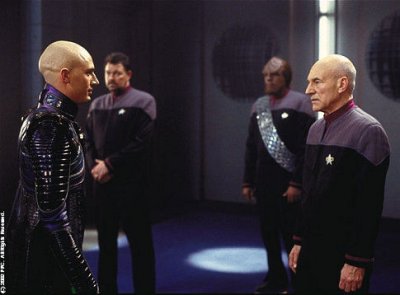Star Trek: Nemesis
To boldly go where no one has gone before. Apart from the 9 other films. Obviously. And the 5 TV series...

There are few certainties in this world, but such certainties as there are affect our lives considerably - things like gravity, death, taxes and dishonest politicians. And, of course, that even-numbered Star Trek films are better than their odd-numbered counterparts.
So does this film hold true to this, or is your world about to come clattering down about your ears? Well, thankfully, it does. By no means the best Trek film (this honour still belongs to First Contact - those who wish to argue, tough, I'm not listening), this is thoroughly enjoyable fare, though you'd be well-advised to leave your brain at the door.
Starting in light-hearted fashion with Captain Picard's best-man speech at Commander Riker and Counsellor Troi's wedding reception, the film introduces all the familiar Enterprise crew members early in the proceedings, and mixes in a bit of humour to get the audience in a receptive mood for what follows. Soon after this comes a mission to a desert planet where Picard (Patrick Stewart), Worf (Michael Dorn) and Data (Brent Spiner) make a most bizarre discovery - parts of an android that bears an uncanny resemblance (i.e. it's identical) to Commander Data.
Ambushed while recovering the last piece, there ensues an enjoyable, dune-buggy-mounted fire fight as the heroes race back to their shuttlecraft, the first of many good action sequences. This craft is named after the Argo, the ship that bore Jason to Colchis in his quest for the Golden Fleece. To use the name of such a famous mythological vessel, one would imagine that it was supposed to be portentous of the events to follow, but beyond the age-old themes of deceit and 'don't trust your evil clone' (OK, this isn't actually in the classic telling of Jason's story) there is no resemblance between Nemesis and the story of the Argonauts' legendary voyage, rendering the choice of name whimsical at best. That it is so visibly placed is somewhat puzzling.
Aboard the Enterprise once more, the crew (strangely incurious about the people who ambushed them on a supposedly primitive, sparsely-populated planet) are despatched to Romulus to discuss a peace treaty, which, unsurprisingly, turns out to be non-existent. It is here that 'Evil Picard Clone' Shinzon (Tom Hardy) turns up with his Stupidly Big Spaceship, and the action really gets going.
We are then treated to much more action than has been seen in any Trek film since The Next Generation crew took over (and they also appear to have beefed-up the Enterprise - it now seems to be able to take as much damage as it did back in the days of Kirk - wayhey!), all of which whips along at a satisfying pace, with plenty of explosions to keep the audience smiling. We also find out that the director is a fan of video games, as we are treated to what looks for all the world like a live action game of Wipeout aboard the Stupidly Big Spaceship (or the Scimitar, as it's actually known). Mixed in with this is some plot exposition, and we find out Shinzon's true agenda, but there are still some glaring holes which are never filled.
The film has definite faults, most notably that Shinzon appears to have no motive to destroy Earth, as is his main desire, and you can't help wondering, after hearing his life story, why the Romulans didn't just kill him. These, and the other sci-fi flaws of slow lasers etc. rankle, but it has never paid to analyse this genre too closely. However, that the main plot device, the annihilation of Earth, has no justification is irritating, and may spoil your enjoyment somewhat if you think too much about it.

Keeping up the good ol' Star Trek tradition of featuring scientific advances that currently occupy the media's interest, Nemesis focuses on the hotly-debated, and morally ambiguous, subject of human cloning, a minefield if ever there was, and explores the belief that personality is not determined by our genes, but by our experience and environment. This is an interesting argument, and one of the few points of the film that requires you to engage your brain.
The clone himself, though, is another matter. Despite supposedly being a genetically-identical, but younger, Jean-Luc Picard, Shinzon bears little resemblance to the inimitable Captain, shaven head aside, and the film would have benefited from an actor closer in talent to the fine Stewart, a Shakespearean actor of no little repute. Rather, Hardy comes across as a space-age Caligula, a whiney brat who can't get his own way, and not the foil to Stewart's capable, calm Picard that the film requires.
It would perhaps have been better to have Stewart play both roles (which would have worked - Brent Spiner once again plays two identical androids, and the matting is seamless), though with another actor already doing two roles, it may not have worked.
Aside from Ron Perlman's rather limp viceroy, the rest of the cast are as you would expect them, playing roles that must be as comfortable and familiar to them as an old pair of shoes. The writer has even done the seemingly-impossible, and managed to find something useful for the most superfluous crew member, Marina Sirtis' Deanna Troi (Betazoid for 'Stating the Bloody Obvious') to do!
Though by no means brilliant, Stuart Baird's direction is steady and assured, and the CGI impressive. The action sequences fly along, and this is an enjoyable addition to the Star Trek canon.
This film receives 3 out of a possible 5 Combined Goodness Units.
Brent Spiner (Commander Data)
Jonathan Frakes (Commander Riker)
Tom Hardy (Shinzon)